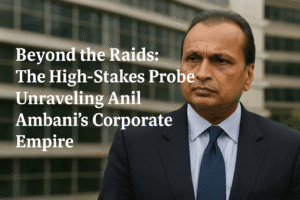Beyond the Raids: The High-Stakes Probe Unraveling Anil Ambani’s Corporate Empire
India’s Enforcement Directorate (ED) is conducting a major probe into Anil Ambani’s Reliance Group, alleging a sophisticated scheme to siphon ₹30 billion ($350 million) from YES Bank between 2017-2019. Investigators claim funds were diverted through shell companies after bribes secured loans that violated banking norms, including reckless lending and falsifying records.
The Reliance Group denies wrongdoing, asserting loans were legitimate, secured, and repaid. This investigation follows years of financial strain, including group insolvencies, YES Bank’s 2020 collapse, and a recent 5-year market ban on Ambani by SEBI for fund diversion.
Shares in key Reliance firms fell 5% on the probe news. The case tests India’s ability to hold powerful entities accountable for financial misconduct, exposing deep concerns about corporate governance, banking integrity, and the protection of public funds. Its outcome carries significant weight for regulatory credibility and market confidence.

Beyond the Raids: The High-Stakes Probe Unraveling Anil Ambani’s Corporate Empire
India’s financial landscape was jolted this week as the Enforcement Directorate (ED) intensified its scrutiny of one of the country’s most prominent industrial dynasties. A sweeping investigation targeting Anil Ambani’s Reliance Group alleges a sophisticated scheme to divert massive public funds, raising profound questions about corporate governance, banking integrity, and regulatory oversight.
The Core Allegations: A Web of Suspicious Transactions
According to sources close to the probe, the ED’s investigation centers on a staggering claim: the alleged siphoning of approximately ₹30 billion ($350 million) in loans obtained from YES Bank between 2017 and 2019. The agency contends this wasn’t mere mismanagement, but a “well-planned” operation involving:
- Shell Company Network: Funds allegedly flowed not to core businesses, but through a labyrinth of shell companies, obscuring their ultimate destination.
- Bribery for Loans: Investigators reportedly possess evidence suggesting bribes were paid to YES Bank officials to secure loan approvals, bypassing standard due diligence.
- Systemic Banking Violations: The probe allegedly uncovered gross violations at YES Bank, including:
- Approving loans for financially weak entities.
- Backdating credit memoranda.
- “Evergreening” loans (issuing new loans to hide existing bad debt).
- Misrepresenting company financials.
The Defense: Denials and Claims of Legitimacy
A Reliance Group source offered a stark rebuttal:
- Loans from YES Bank followed “due process” and were “fully secured.”
- Allegations of bribery are “incorrect.”
- They acknowledge Reliance Home Finance (RHFL) extended loans to companies linked to Rana Kapoor (YES Bank’s former promoter), but insist these were “fully secured,” “on merit,” and completely repaid with interest.
The listed entities, Reliance Infrastructure and Reliance Power, told stock exchanges the ED actions have “absolutely no impact” on operations or stakeholders. They characterized the probe as relating to decade-old transactions of now-separate entities (RCOM, RHFL). However, the government source countered, alleging Reliance Infrastructure diverted over ₹100 billion via disguised “inter-corporate deposits” to other group firms through an undisclosed related entity, bypassing shareholder and audit committee approvals.
A Pattern Under Scrutiny: Regulatory History Looms Large
This investigation doesn’t exist in a vacuum. It follows a troubled trajectory for Anil Ambani’s ventures:
- Multiple Insolvencies: Several key group companies collapsed into bankruptcy starting in 2017.
- YES Bank’s Downfall: YES Bank itself, a major lender to the group, collapsed in 2020 and required a state-backed rescue. Kapoor faces separate fraud charges.
- SEBI’s Wrath: Just last year (August 2024), market regulator SEBI barred Anil Ambani and 24 others from securities markets for 5 years, citing fund diversion from RHFL. SEBI’s findings reportedly fed into the current ED probe.
Market Reaction and Legal Pathways
Investor confidence wavered immediately, with shares of Reliance Infrastructure and Reliance Power dropping up to 5% on the probe news. Legally, the ED now has the power to potentially seize assets deemed “proceeds of crime,” though the group retains the right to challenge these actions in court. Anil Ambani’s current absence from listed company boards, enforced by SEBI (which he is contesting), adds another layer of complexity.
The Broader Significance: More Than Just One Group
This high-profile probe transcends the fate of the Reliance Anil Dhirubhai Ambani Group:
- Test of Enforcement: It is a critical test for India’s financial crime agencies. Can they effectively unravel complex corporate structures and hold powerful figures accountable, especially when allegations involve collusion with bank officials?
- Banking Sector Scars: It revisits the wounds of the YES Bank collapse, forcing a reckoning with past lending practices and oversight failures that eroded public trust and required taxpayer-funded intervention.
- Corporate Governance Imperative: The repeated allegations of fund diversion, shell companies, and bypassing governance procedures underscore systemic vulnerabilities in corporate India. It highlights the urgent need for stronger internal controls, truly independent boards, and transparent related-party transaction disclosures.
- Investor Confidence: Such cases, involving high-profile industrialists, inevitably impact foreign and domestic investor perception of risk and regulatory robustness within the Indian market.
Conclusion: Unanswered Questions at an Inflection Point
While the Reliance Group dismisses the probe as old news and denies wrongdoing, the sheer scale of the ED’s operation and the specific, serious nature of the allegations suggest a deeply consequential investigation is underway. The outcome hinges on the agency’s ability to substantiate its claims about shell companies, bribes, and fund diversions against the group’s assertions of legitimacy and full repayment.
Beyond the legal battles, this case forces a necessary conversation about the checks and balances within India’s rapidly growing economy. Can regulatory bodies deter the misuse of public funds and ensure a level playing field? The answers will resonate far beyond the boardrooms of the Reliance Group, shaping the future integrity of India’s financial system. The stakes, for both the individuals involved and the system itself, could not be higher.
You must be logged in to post a comment.